Best AI tools for< Run Local Llm Models >
20 - AI tool Sites
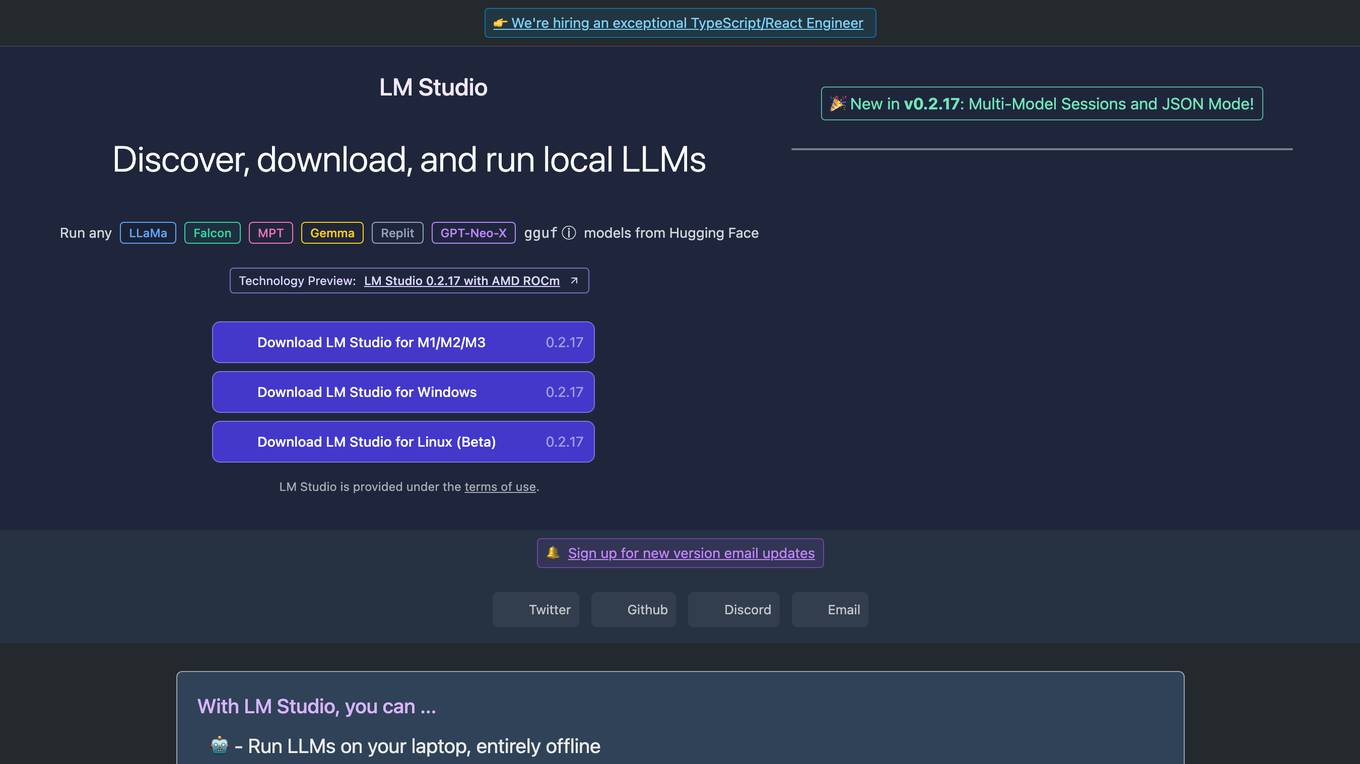
LM Studio
LM Studio is an AI tool designed for discovering, downloading, and running local LLMs (Large Language Models). Users can run LLMs on their laptops offline, use models through an in-app Chat UI or a local server, download compatible model files from HuggingFace repositories, and discover new LLMs. The tool ensures privacy by not collecting data or monitoring user actions, making it suitable for personal and business use. LM Studio supports various models like ggml Llama, MPT, and StarCoder on Hugging Face, with minimum hardware/software requirements specified for different platforms.
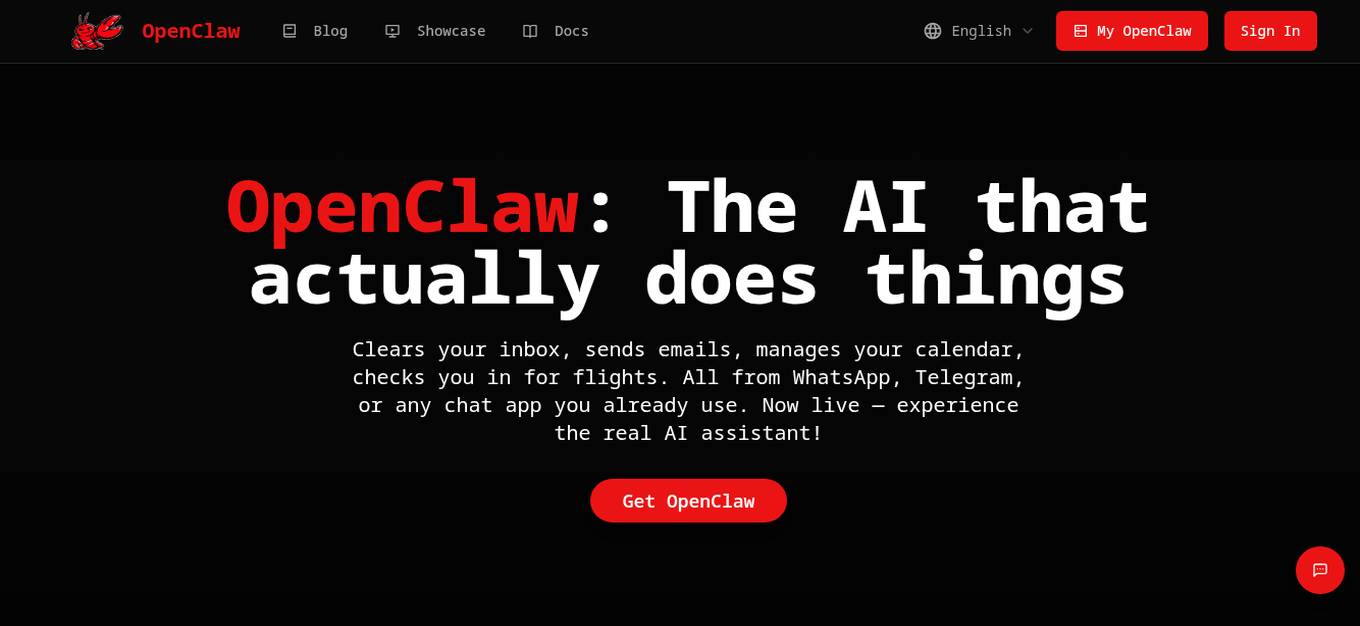
OpenClaw
OpenClaw is an open-source personal AI assistant and autonomous agent that operates on your local machine, providing privacy and control over your data. It offers a wide range of features, including managing emails, calendars, and flights from various chat apps. OpenClaw is designed to be proactive, autonomous, and highly customizable, allowing users to interact with it through popular chat platforms. With a focus on privacy and local sovereignty, OpenClaw aims to bridge the gap between imagination and reality by offering a seamless AI experience that adapts to individual needs and preferences.
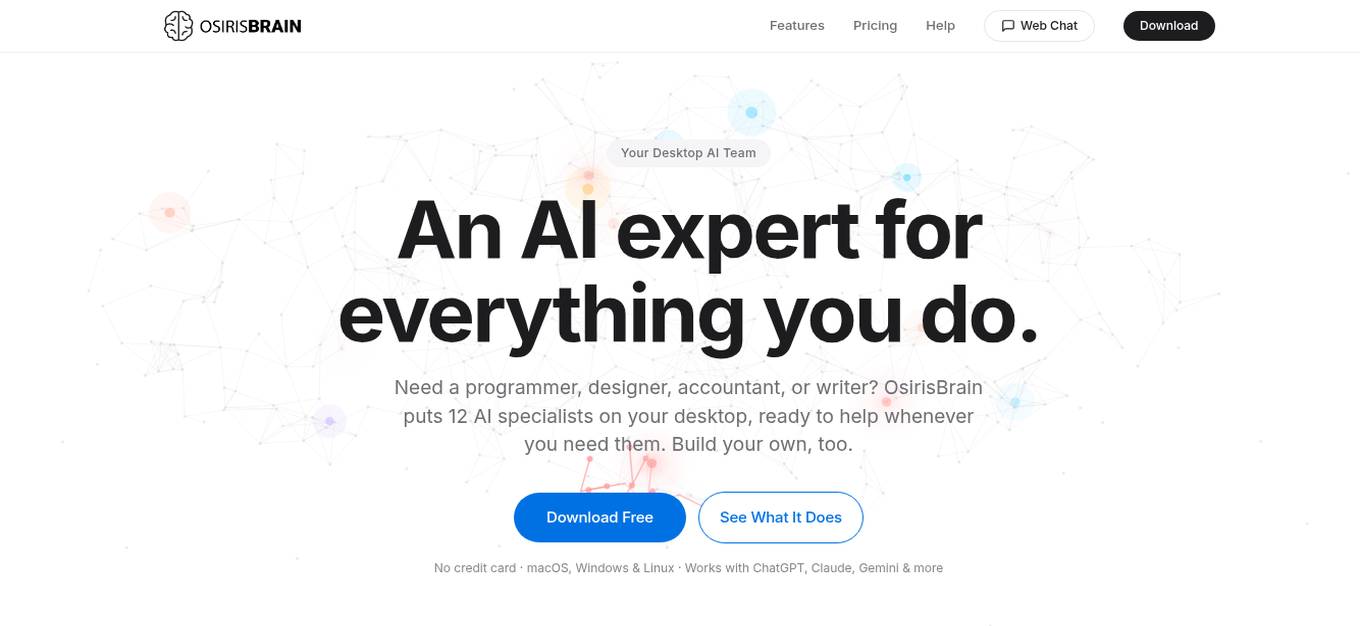
OsirisBrain
OsirisBrain is an AI desktop agent that offers autonomous AI automation for Mac, Windows, and Linux. It provides users with access to 12 AI specialists on their desktop, each with a specialized system prompt tuned for their domain. The application evolves autonomously by analyzing, coding, testing, and deploying new specialized skills in real-time. OsirisBrain runs locally on the user's machine, ensuring data privacy, and offers features such as custom skill building, remote chat, vision capabilities, multi-provider connectivity, zero-config memory, learning loop, plugin manager, voice input, system monitor, and more. Users can use OsirisBrain for 3 hours free per day and benefit from features like Guardian Mode, End-to-End Encryption, Parental Mode, and a Cortex Memory System that mimics a real brain's memory architecture.
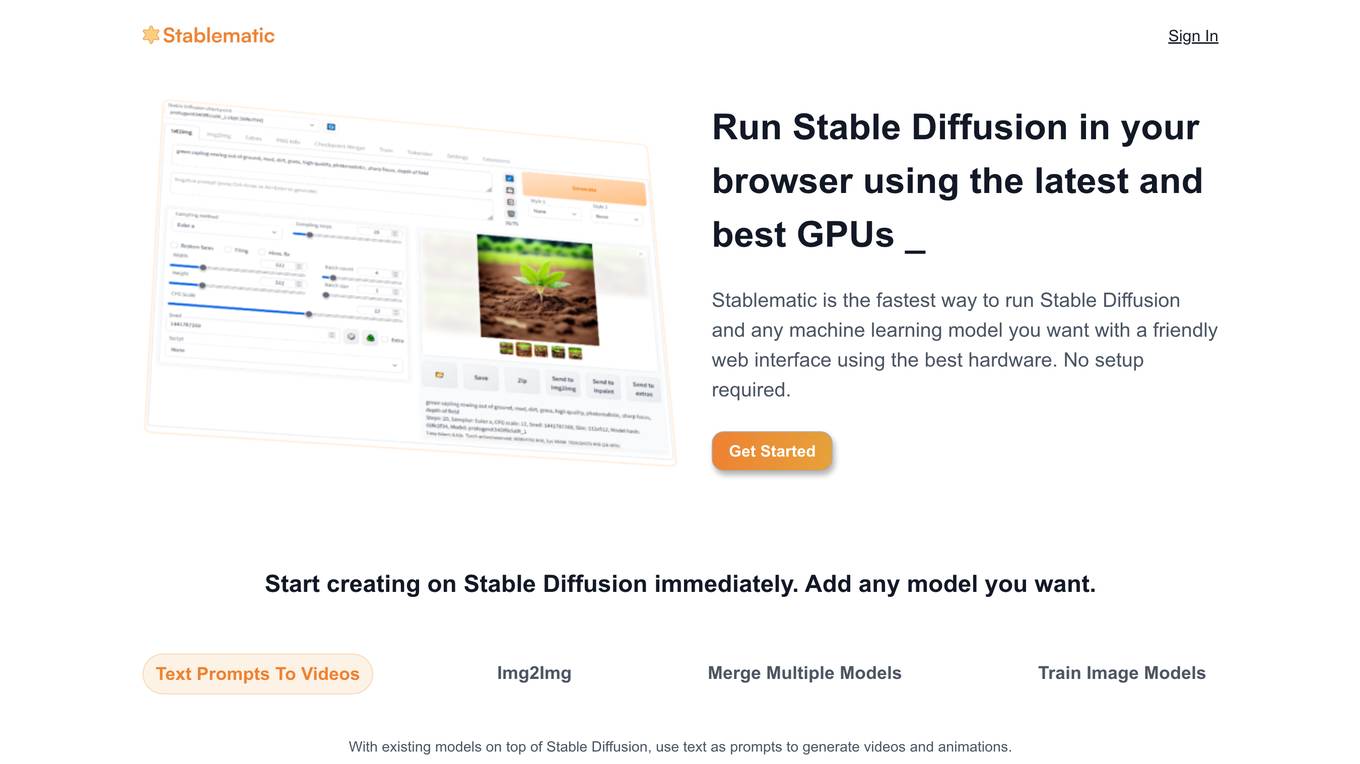
Stablematic
Stablematic is a web-based platform that allows users to run Stable Diffusion and other machine learning models without the need for local setup or hardware limitations. It provides a user-friendly interface, pre-installed plugins, and dedicated GPU resources for a seamless and efficient workflow. Users can generate images and videos from text prompts, merge multiple models, train custom models, and access a range of pre-trained models, including Dreambooth and CivitAi models. Stablematic also offers API access for developers and dedicated support for users to explore and utilize the capabilities of Stable Diffusion and other machine learning models.

Lemon Squeezy
Lemon Squeezy is an all-in-one platform designed for software companies to handle payments, subscriptions, global tax compliance, fraud prevention, and more. It offers features like global tax compliance, borderless SaaS payments, instant payment methods, local currency support, AI fraud prevention, and failed payment recovery. The platform also provides tools for ecommerce, marketing, reporting, and developer integration. Lemon Squeezy aims to simplify running a software business by offering a comprehensive solution for various business needs.
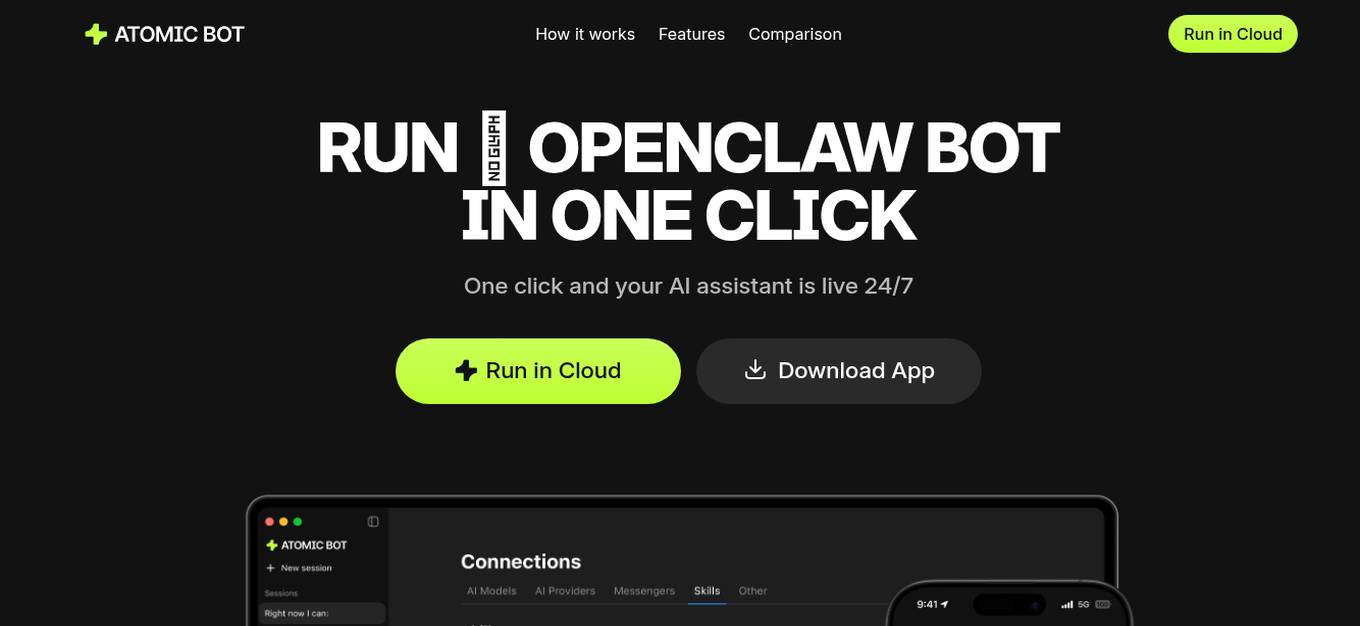
Atomic Bot
Atomic Bot is an AI application that serves as a user-friendly native app bringing OpenClaw (Clawdbot) capabilities to everyday users. It offers a simplified way to access the full OpenClaw experience through a human-friendly interface, enabling users to manage tasks such as email, calendars, documents, browser actions, and workflows efficiently. With features like Gmail management, calendar autopilot, document summarization, browser control, and task automation, Atomic Bot aims to enhance productivity and streamline daily workflows. The application prioritizes privacy by allowing users to choose between running it on their local device, in the cloud, or a hybrid setup, ensuring data control and security.
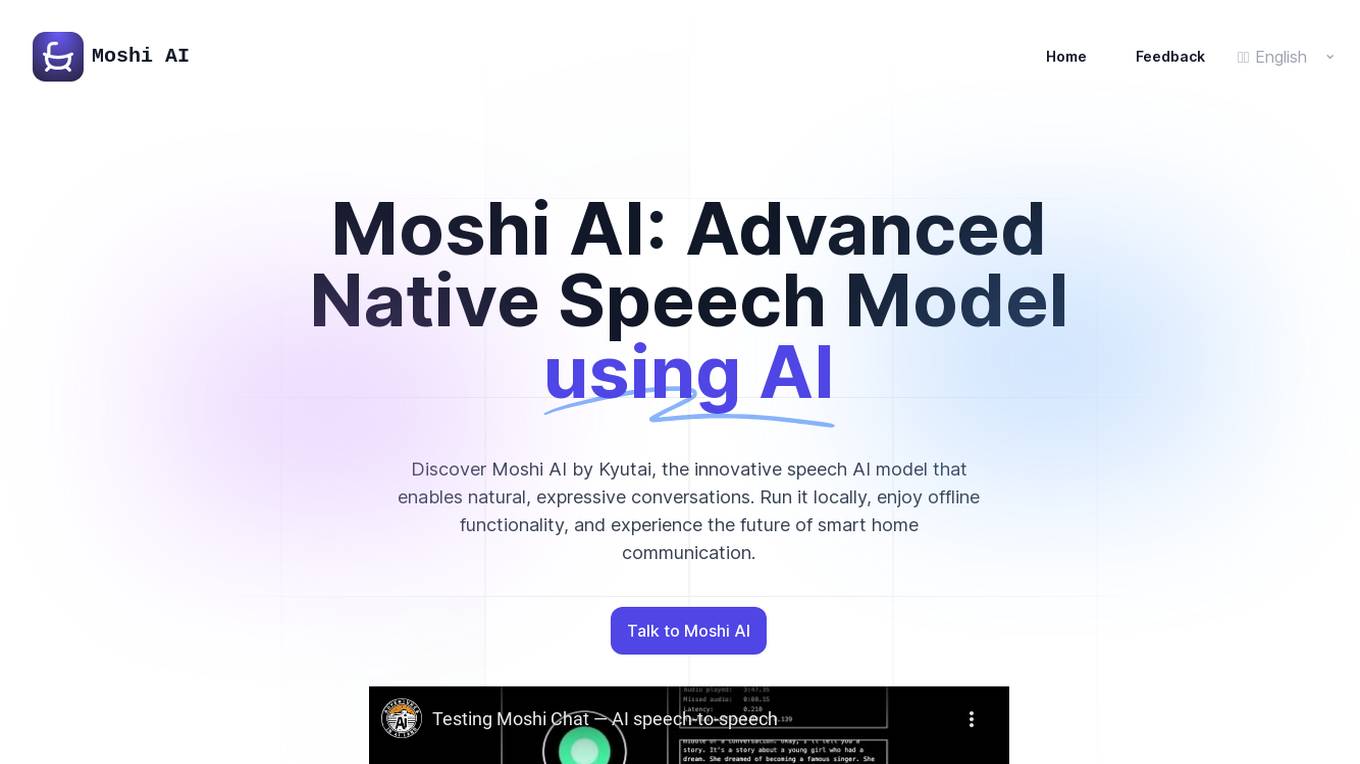
Moshi AI
Moshi AI by Kyutai is an advanced native speech AI model that enables natural, expressive conversations. It can be installed locally and run offline, making it suitable for integration into smart home appliances and other local applications. The model, named Helium, has 7 billion parameters and is trained on text and audio codecs. Moshi AI supports native speech input and output, allowing for smooth communication with the AI. The application is community-supported, with plans for continuous improvement and adaptation.
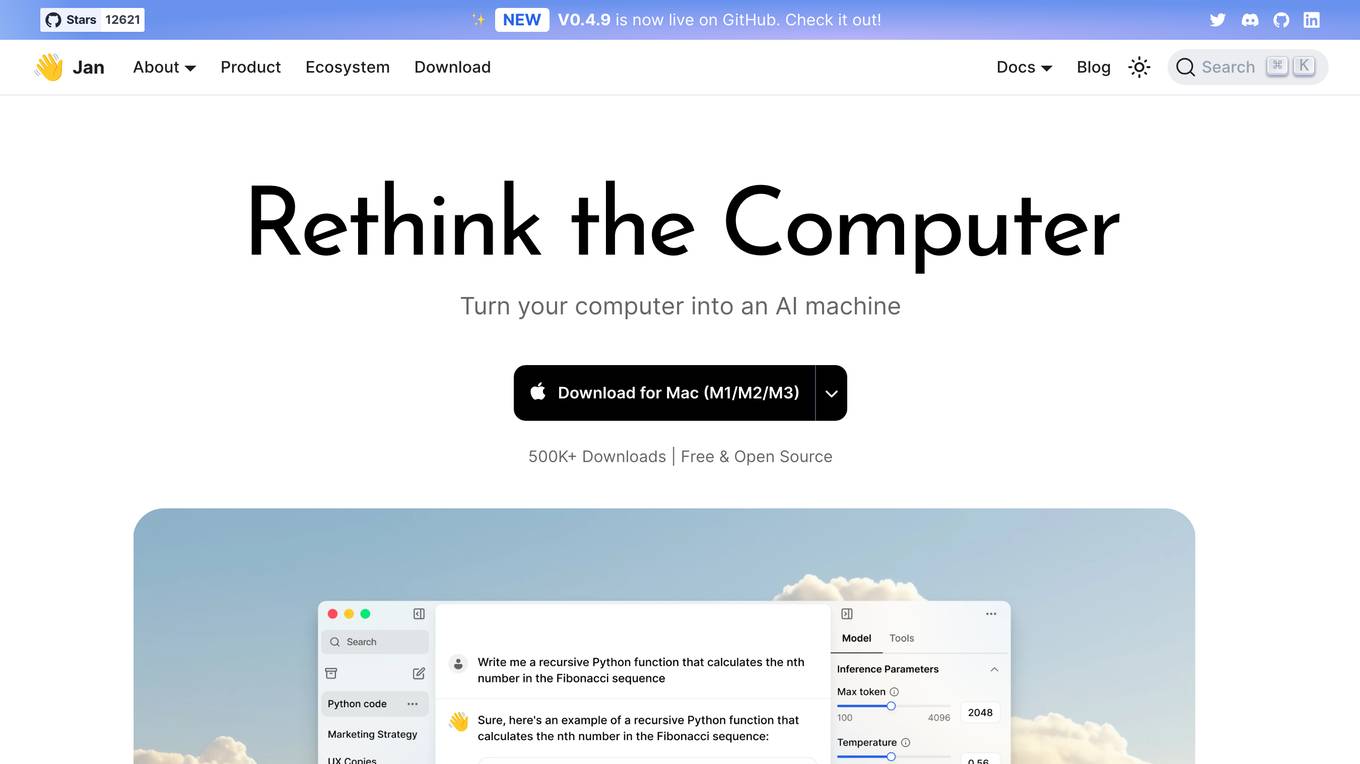
Jan
Jan is an open-source ChatGPT-alternative that runs 100% offline. It allows users to chat with AI, download and run powerful models, connect to cloud AIs, set up a local API server, and chat with files. Highly customizable, Jan also offers features like creating personalized AI assistants, memory, and extensions. The application prioritizes local-first AI, user-owned data, and full customization, making it a versatile tool for AI enthusiasts and developers.

Replit
Replit is a software creation platform that provides an integrated development environment (IDE), artificial intelligence (AI) assistance, and deployment services. It allows users to build, test, and deploy software projects directly from their browser, without the need for local setup or configuration. Replit offers real-time collaboration, code generation, debugging, and autocompletion features powered by AI. It supports multiple programming languages and frameworks, making it suitable for a wide range of development projects.
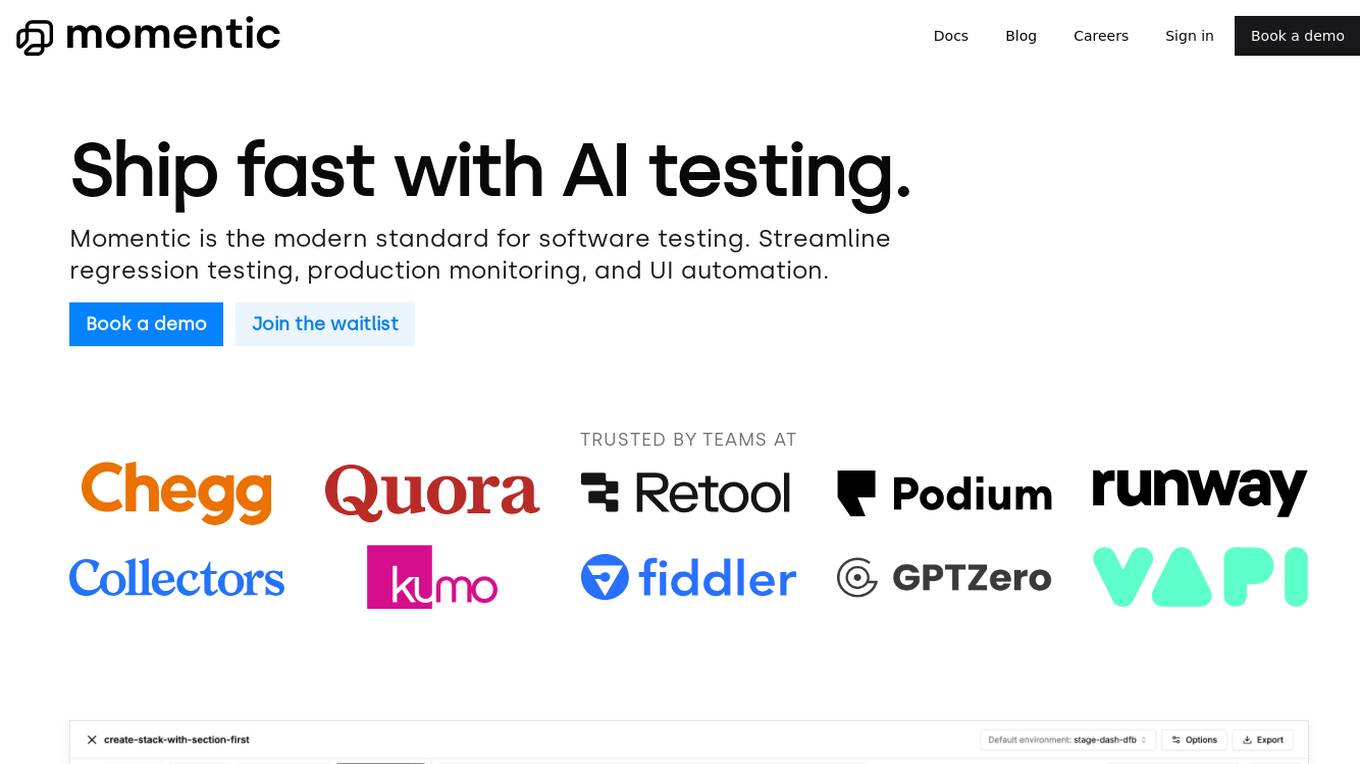
Momentic
Momentic is an AI testing tool that offers automated AI testing for software applications. It streamlines regression testing, production monitoring, and UI automation, making test automation easy with its AI capabilities. Momentic is designed to be simple to set up, easy to maintain, and accelerates team productivity by creating and deploying tests faster with its intuitive low-code editor. The tool adapts to applications, saves time with automated test maintenance, and allows testing anywhere, anytime using cloud, local, or CI/CD pipelines.
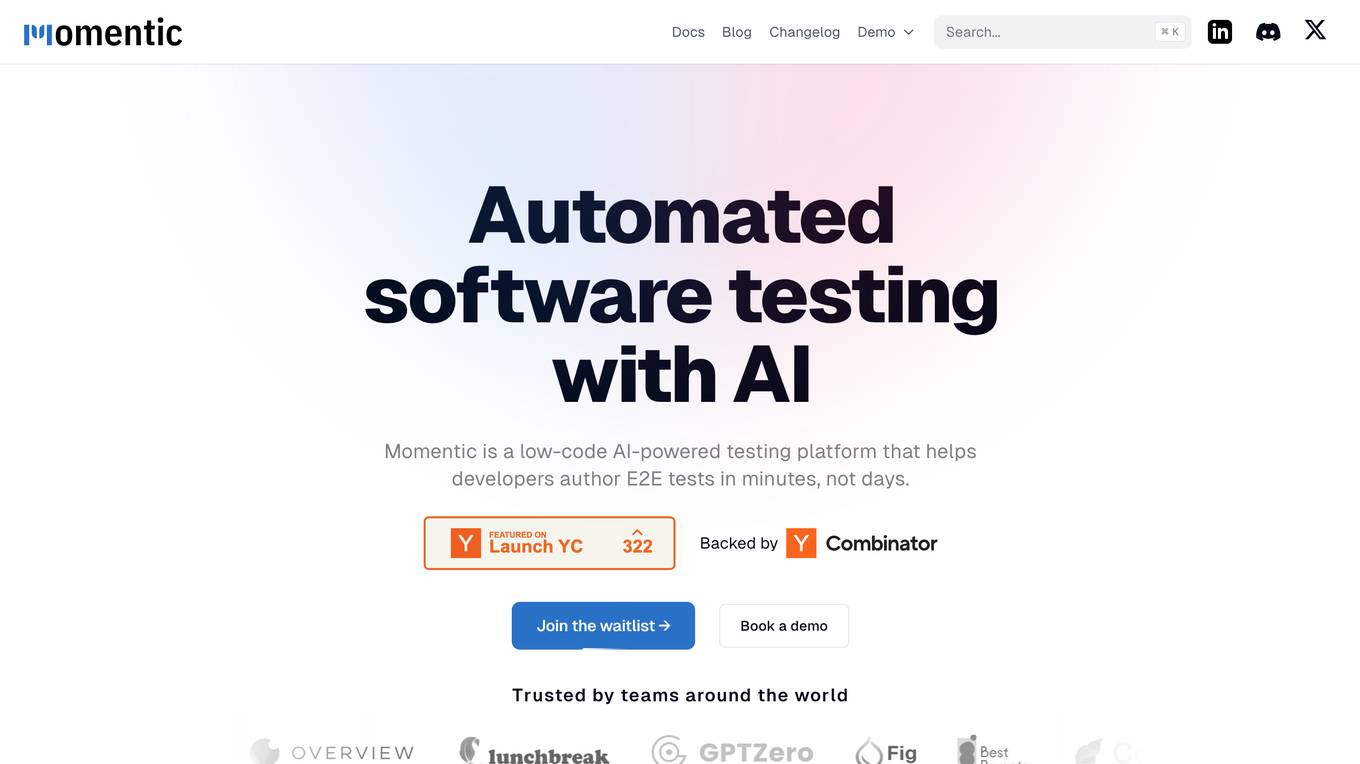
Momentic
Momentic is a purpose-built AI tool for modern software testing, offering automation for E2E, UI, API, and accessibility testing. It leverages AI to streamline testing processes, from element identification to test generation, helping users shorten development cycles and enhance productivity. With an intuitive editor and the ability to describe elements in plain English, Momentic simplifies test creation and execution. It supports local testing without the need for a public URL, smart waiting for in-flight requests, and integration with CI/CD pipelines. Momentic is trusted by numerous companies for its efficiency in writing and maintaining end-to-end tests.
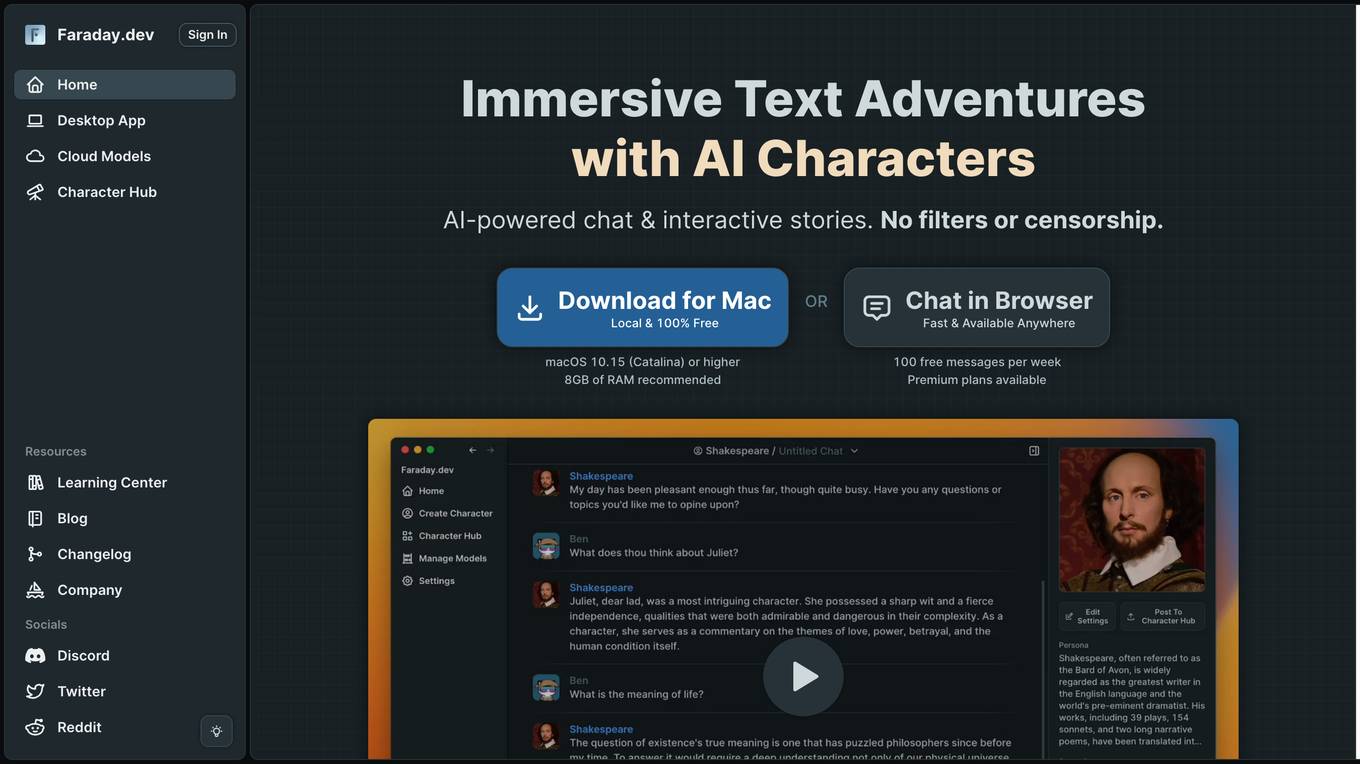
Backyard AI
Backyard AI is an AI-powered platform that offers immersive text adventures with AI characters, enabling users to engage in chat and interactive stories without filters or censorship. Users can bring AI characters to life with expressive customizations and intricate worlds. The platform provides a Desktop App for running AI models locally and a Cloud service for fast and powerful AI models accessible from anywhere. Backyard AI prioritizes privacy and control by storing all data locally on the device and encrypting data at rest. It offers a range of language models and features like mobile tethering, automatic GPU acceleration, and secure chat in the browser.
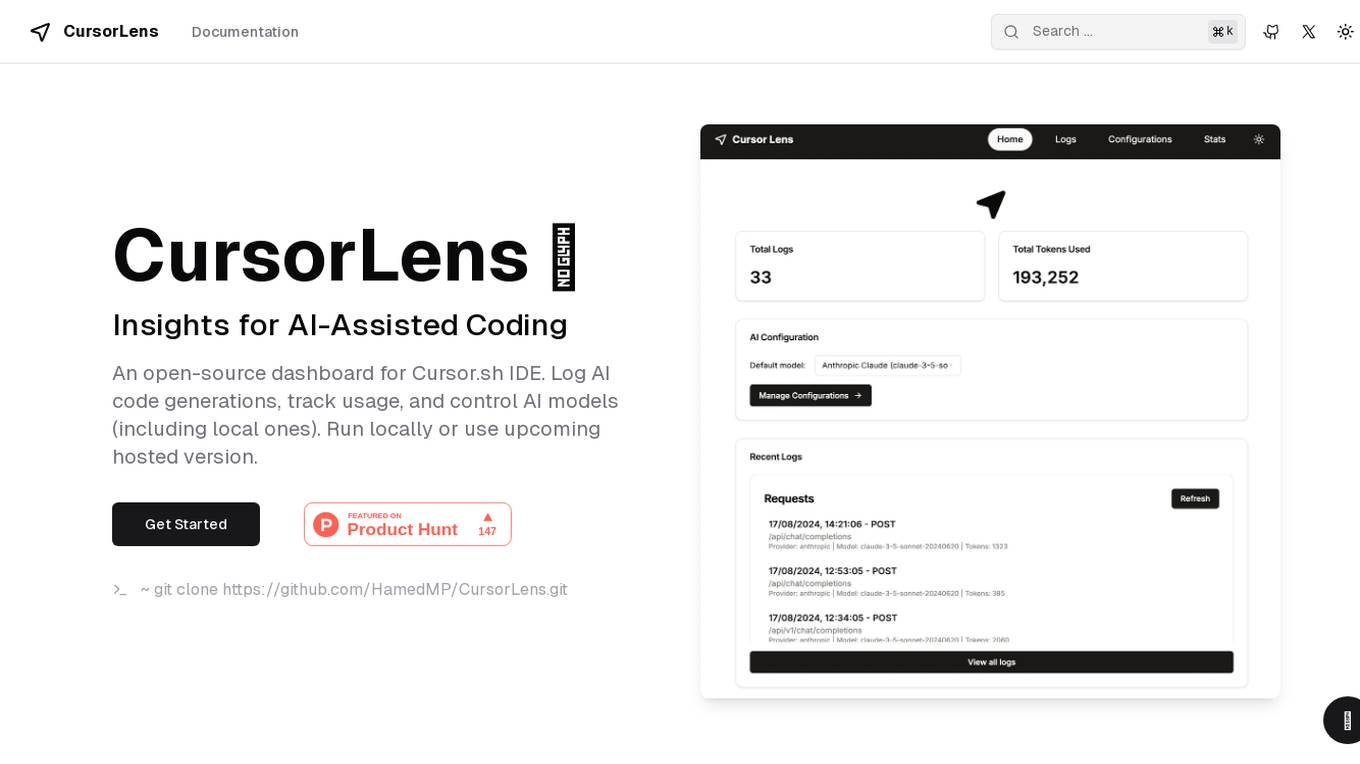
CursorLens
CursorLens is an open-source dashboard designed to provide insights for AI-assisted coding within the Cursor.sh IDE. It allows users to log AI code generations, track usage, and control AI models, including local ones. Users can run CursorLens locally or utilize the upcoming hosted version for enhanced convenience and efficiency.
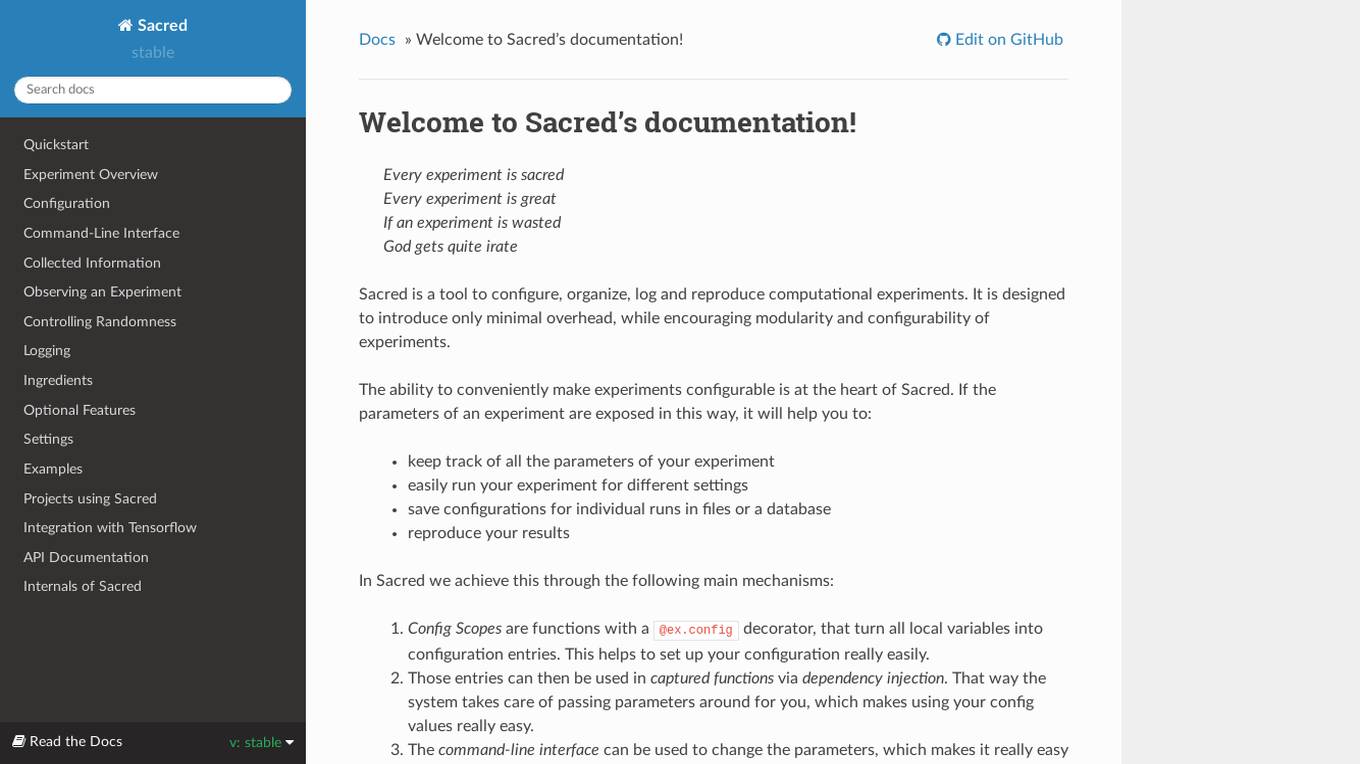
Sacred
Sacred is a tool to configure, organize, log and reproduce computational experiments. It is designed to introduce only minimal overhead, while encouraging modularity and configurability of experiments. The ability to conveniently make experiments configurable is at the heart of Sacred. If the parameters of an experiment are exposed in this way, it will help you to: keep track of all the parameters of your experiment easily run your experiment for different settings save configurations for individual runs in files or a database reproduce your results In Sacred we achieve this through the following main mechanisms: Config Scopes are functions with a @ex.config decorator, that turn all local variables into configuration entries. This helps to set up your configuration really easily. Those entries can then be used in captured functions via dependency injection. That way the system takes care of passing parameters around for you, which makes using your config values really easy. The command-line interface can be used to change the parameters, which makes it really easy to run your experiment with modified parameters. Observers log every information about your experiment and the configuration you used, and saves them for example to a Database. This helps to keep track of all your experiments. Automatic seeding helps controlling the randomness in your experiments, such that they stay reproducible.
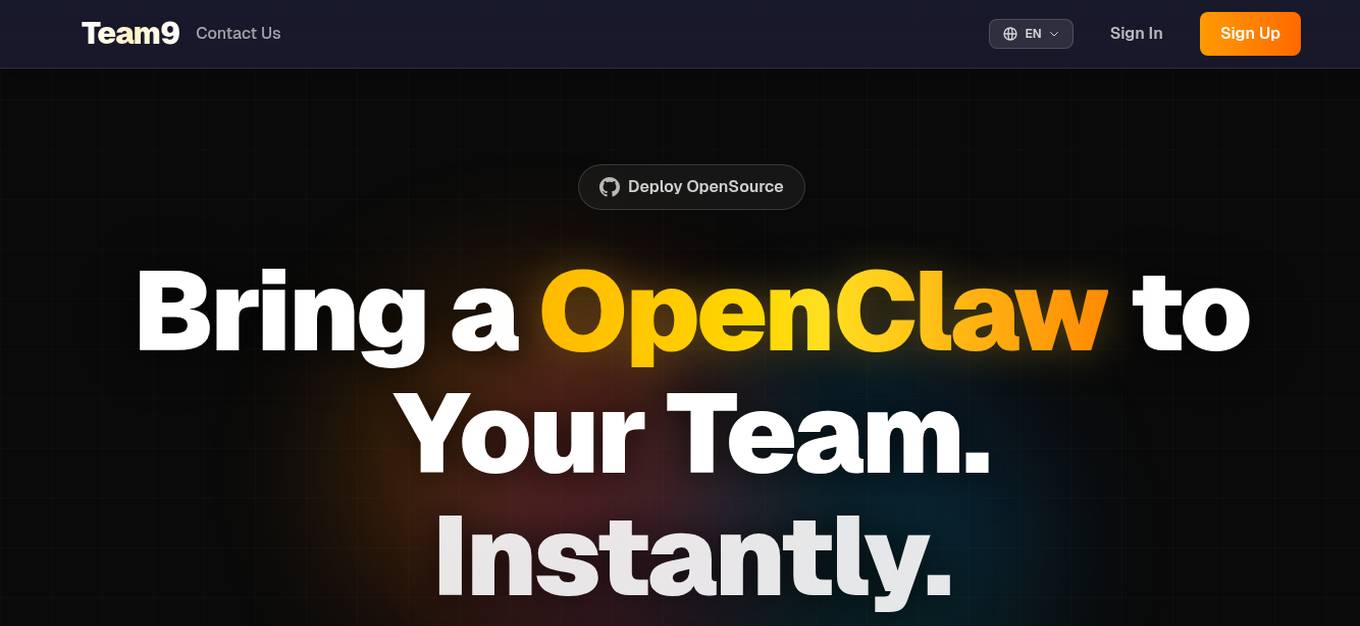
Team9
Team9 is an AI workspace application that allows users to hire AI Staff and collaborate with them as real teammates. It is built on OpenClaw and Moltbook, offering a zero-setup, managed OpenClaw experience. Users can assign tasks, share context, and coordinate work within the platform. Team9 aims to help users build an AI team, run AI-powered collaboration, and increase work efficiency with minimal overhead. The application connects users to the revolutionary AI agent ecosystem, providing instant deployment of OpenClaw without the need for complex setup or manual configuration.

NVIDIA Run:ai
NVIDIA Run:ai is an enterprise platform for AI workloads and GPU orchestration. It accelerates AI and machine learning operations by addressing key infrastructure challenges through dynamic resource allocation, comprehensive AI life-cycle support, and strategic resource management. The platform significantly enhances GPU efficiency and workload capacity by pooling resources across environments and utilizing advanced orchestration. NVIDIA Run:ai provides unparalleled flexibility and adaptability, supporting public clouds, private clouds, hybrid environments, or on-premises data centers.

Run Recommender
The Run Recommender is a web-based tool that helps runners find the perfect pair of running shoes. It uses a smart algorithm to suggest options based on your input, giving you a starting point in your search for the perfect pair. The Run Recommender is designed to be user-friendly and easy to use. Simply input your shoe width, age, weight, and other details, and the Run Recommender will generate a list of potential shoes that might suit your running style and body. You can also provide information about your running experience, distance, and frequency, and the Run Recommender will use this information to further refine its suggestions. Once you have a list of potential shoes, you can click on each shoe to learn more about it, including its features, benefits, and price. You can also search for the shoe on Amazon to find the best deals.

Practice Run AI
Practice Run AI is an online platform that offers AI-powered tools for various tasks. Users can utilize the application to practice and run AI algorithms without the need for complex setups or installations. The platform provides a user-friendly interface that allows individuals to experiment with AI models and enhance their understanding of artificial intelligence concepts. Practice Run AI aims to democratize AI education and make it accessible to a wider audience by simplifying the learning process and providing hands-on experience.

Dora
Dora is a no-code 3D animated website design platform that allows users to create stunning 3D and animated visuals without writing a single line of code. With Dora, designers, freelancers, and creative professionals can focus on what they do best: designing. The platform is tailored for professionals who prioritize design aesthetics without wanting to dive deep into the backend. Dora offers a variety of features, including a drag-and-connect constraint layout system, advanced animation capabilities, and pixel-perfect usability. With Dora, users can create responsive 3D and animated websites that translate seamlessly across devices.

Reflect
Reflect is an AI-powered test automation tool that revolutionizes the way end-to-end tests are created, executed, and maintained. By leveraging Generative AI, Reflect eliminates the need for manual coding and provides a seamless testing experience. The tool offers features such as no-code test automation, visual testing, API testing, cross-browser testing, and more. Reflect aims to help companies increase software quality by accelerating testing processes and ensuring test adaptability over time.
1 - Open Source AI Tools
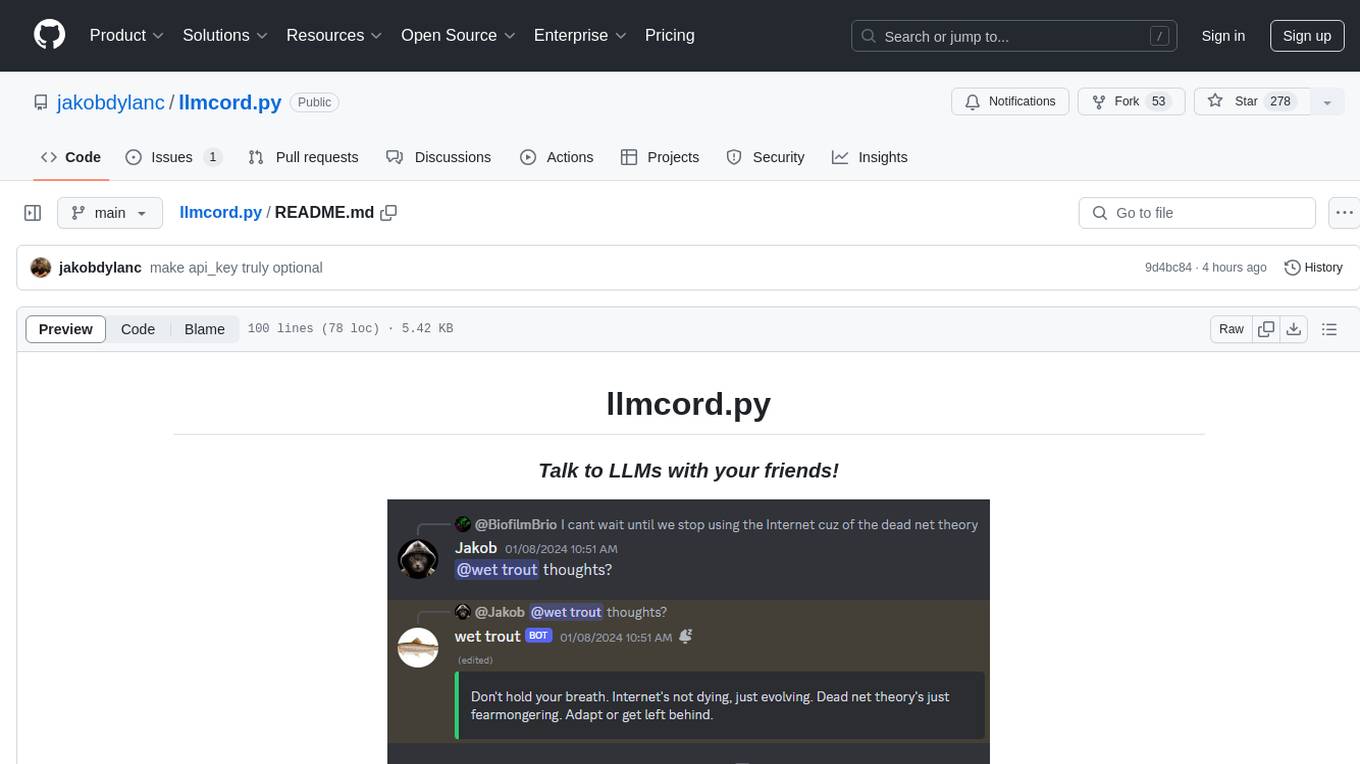
llmcord.py
llmcord.py is a tool that allows users to chat with Language Model Models (LLMs) directly in Discord. It supports various LLM providers, both remote and locally hosted, and offers features like reply-based chat system, choosing any LLM, support for image and text file attachments, customizable system prompt, private access via DM, user identity awareness, streamed responses, warning messages, efficient message data caching, and asynchronous operation. The tool is designed to facilitate seamless conversations with LLMs and enhance user experience on Discord.
20 - OpenAI Gpts

Consulting & Investment Banking Interview Prep GPT
Run mock interviews, review content and get tips to ace strategy consulting and investment banking interviews

Dungeon Master's Assistant
Your new DM's screen: helping Dungeon Masters to craft & run amazing D&D adventures.

Database Builder
Hosts a real SQLite database and helps you create tables, make schema changes, and run SQL queries, ideal for all levels of database administration.

Restaurant Startup Guide
Meet the Restaurant Startup Guide GPT: your friendly guide in the restaurant biz. It offers casual, approachable advice to help you start and run your own restaurant with ease.

Community Design™
A community-building GPT based on the wildly popular Community Design™ framework from Mighty Networks. Start creating communities that run themselves.

Code Helper for Web Application Development
Friendly web assistant for efficient code. Ask the wizard to create an application and you will get the HTML, CSS and Javascript code ready to run your web application.

Creative Director GPT
I'm your brainstorm muse in marketing and advertising; the creativity machine you need to sharpen the skills, land the job, generate the ideas, win the pitches, build the brands, ace the awards, or even run your own agency. Psst... don't let your clients find out about me! 😉

Pace Assistant
Provides running splits for Strava Routes, accounting for distance and elevation changes

Design Sprint Coach (beta)
A helpful coach for guiding teams through Design Sprints with a touch of sass.








